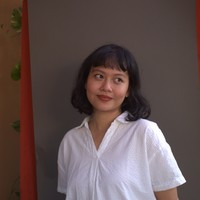
Dede Pramayoza
Dede Pramayoza awarded his MA and Ph.D through the Postgraduate School, Gadjah Mada University. He wrote his thesis on practices of the post-colonial theatre from West Sumatra, named "Sandiwara Kampuang".
Supervisors: Dr. Lono Simatupang, MA, Prof. Dr. Soebakdi Sumanto, and Dr. Sal Murgiyanto
Supervisors: Dr. Lono Simatupang, MA, Prof. Dr. Soebakdi Sumanto, and Dr. Sal Murgiyanto
less
Related Authors
Matthew I Cohen
University of Connecticut
Wacana Journal of the Humanities of Indonesia
Universitas Indonesia
Saaduddin Saaduddin
Institut Seni Indonesia Padangpanjang
InterestsView All (12)










Uploads
Papers by Dede Pramayoza
interviews. The results of the qualitative analysis show that writing a play script can build a play’s creative ethos in sandiwara, bring up the quality, and originality of the ideas and themes. One of the drivers of creativity in sandiwara is nostalgia, the longing for the events of sandiwara as a medium for evoking the memories of ancestors, hometown, rural creative space, and knowledge production space. The process of designing dramaturgy worksheets shows that sandiwara performers’ perceptions tend to be optimistic about the progress of new media. Sandiwara performers see new media as an opportunity to elevate their performance and showcase their contemporary spirit.
interdisciplinary manner, encompassing both descriptive and normative
perspectives. From a descriptive standpoint, the spectrum is shaped by various ways of attributing meaning to theater as an entity. In a normative
approach, various disciplines offer perspectives that contribute to creating
a spectrum of meaning for theater in relation to the life of Indonesian society.
Through a literature review, the research identifies at least three approaches
to constructing theater studies in Indonesia: synchronic, diachronic and,
combined. These three approaches are drawn from disciplines outside of
theater, such as historical, anthropological, and sociological studies. Based on this perspectives, theater studies in Indonesia has moved from viewing theater in its meaning as a form of sacred ritual in the past to theater as symbolic capital today. These interdisciplinary perspective has an influence on the meaning of theater in theater studies itself as a discipline. Theater in Indonesia as a subject of study, therefore, is not only understood as an art that originates from dramatic works, but is more broadly understood as all forms of art that are centered on human action displayed in live performances, including sacred rituals, cultural performances, and theatrical protests.
interviews. The results of the qualitative analysis show that writing a play script can build a play’s creative ethos in sandiwara, bring up the quality, and originality of the ideas and themes. One of the drivers of creativity in sandiwara is nostalgia, the longing for the events of sandiwara as a medium for evoking the memories of ancestors, hometown, rural creative space, and knowledge production space. The process of designing dramaturgy worksheets shows that sandiwara performers’ perceptions tend to be optimistic about the progress of new media. Sandiwara performers see new media as an opportunity to elevate their performance and showcase their contemporary spirit.
interdisciplinary manner, encompassing both descriptive and normative
perspectives. From a descriptive standpoint, the spectrum is shaped by various ways of attributing meaning to theater as an entity. In a normative
approach, various disciplines offer perspectives that contribute to creating
a spectrum of meaning for theater in relation to the life of Indonesian society.
Through a literature review, the research identifies at least three approaches
to constructing theater studies in Indonesia: synchronic, diachronic and,
combined. These three approaches are drawn from disciplines outside of
theater, such as historical, anthropological, and sociological studies. Based on this perspectives, theater studies in Indonesia has moved from viewing theater in its meaning as a form of sacred ritual in the past to theater as symbolic capital today. These interdisciplinary perspective has an influence on the meaning of theater in theater studies itself as a discipline. Theater in Indonesia as a subject of study, therefore, is not only understood as an art that originates from dramatic works, but is more broadly understood as all forms of art that are centered on human action displayed in live performances, including sacred rituals, cultural performances, and theatrical protests.